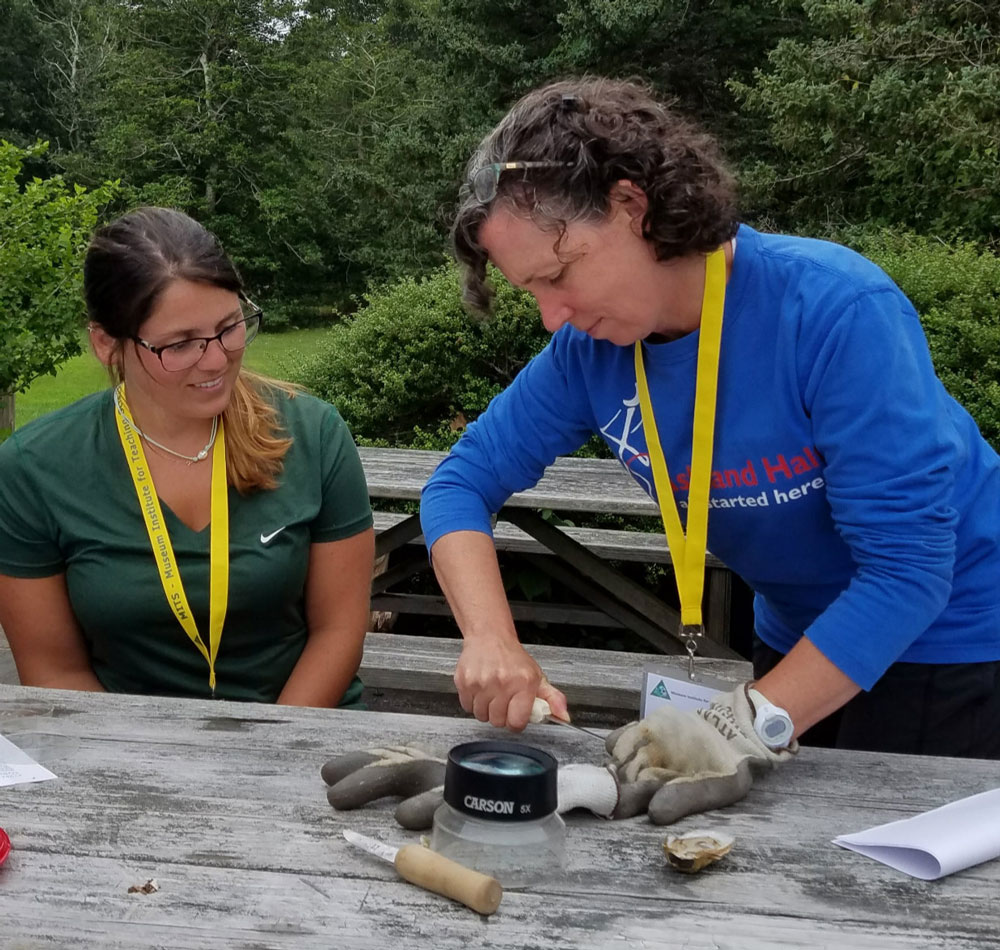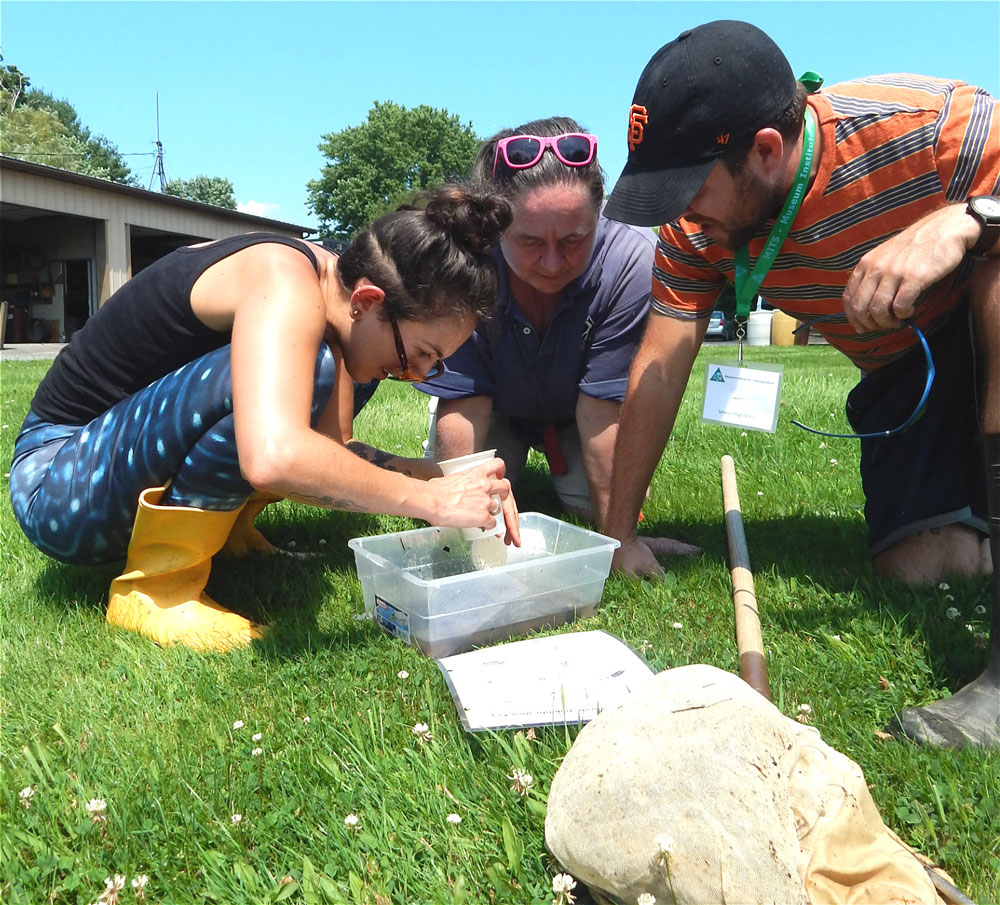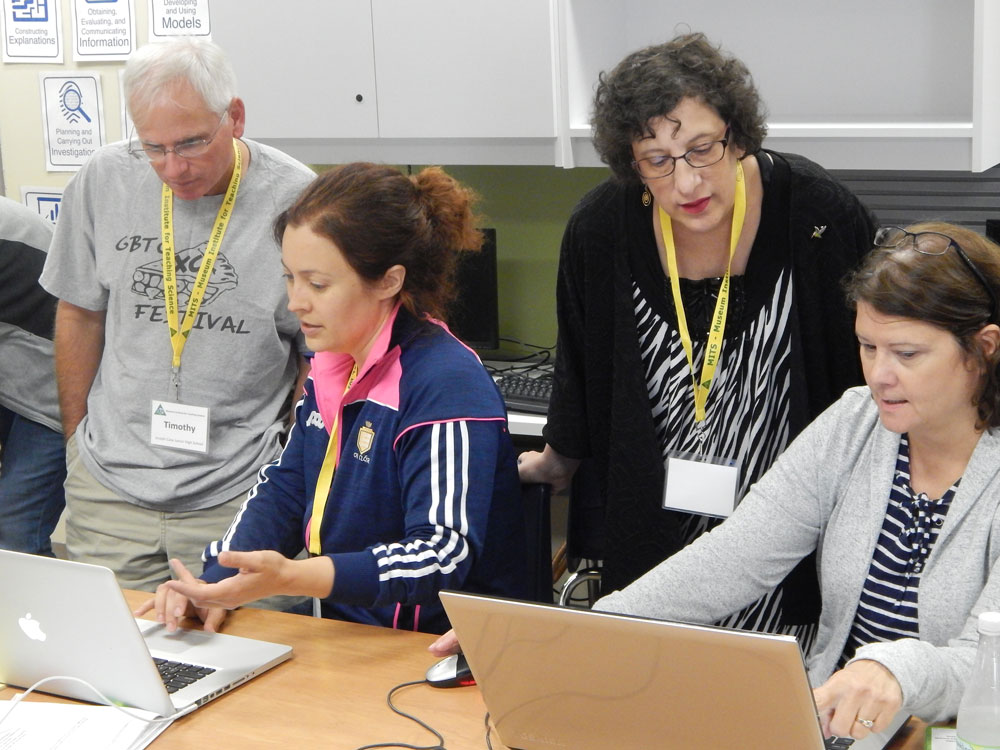Thursday, August 17, 2017
For Immediate Release
MITS 2017 Summer Professional Development Institutes a Success
The Museum Institute for Teaching Science (MITS) brings hands-on, minds-on, inquiry-based professional development to K-12 educators through programs with diverse science content. Since its inception in 1986, MITS has run annual graduate-level Summer Professional Development Institutes through regional partnerships and collaborations with scientific, educational and cultural organizations such as museums and nature centers. This year, institutes were held in the Cape Cod, Berkshire, MetroWest, North Shore and Southeast Regions of Massachusetts. Science content themes included geology, ecology, alternative energy, marine science, water/watersheds and climate change. Each institute highlighted local resources, such as field sites and classroom resources, that teachers can utilize during the school year. The overarching goal of MITS summer institutes is to immerse educators in first-hand learning experiences that blend rigorous science content with inquiry-based pedagogy that teachers can take back to their classrooms.
programs with diverse science content. Since its inception in 1986, MITS has run annual graduate-level Summer Professional Development Institutes through regional partnerships and collaborations with scientific, educational and cultural organizations such as museums and nature centers. This year, institutes were held in the Cape Cod, Berkshire, MetroWest, North Shore and Southeast Regions of Massachusetts. Science content themes included geology, ecology, alternative energy, marine science, water/watersheds and climate change. Each institute highlighted local resources, such as field sites and classroom resources, that teachers can utilize during the school year. The overarching goal of MITS summer institutes is to immerse educators in first-hand learning experiences that blend rigorous science content with inquiry-based pedagogy that teachers can take back to their classrooms.
Regional One-week Institutes
In the Berkshire mountains, grades 3-8 educators investigated glacial striations and rock formations to better understand geologic time. They modeled the paths water takes down the mountains and used field data to create a collaborative digital project to explain how scientific processes have shaped the area. At the Cape Cod institute, grades 3-8 educators explored water and marine science. They visited research laboratories, toured a local fish hatchery, investigated oyster farms and went behind the scenes at a marina with environmentally sustainable practices to understand the role humans play in maintaining healthy ecosystems. Grades 6-12 educators at the MetroWest institute learned about the science of climate change through hands-on and laboratory experiments as well as guest lectures. They evaluated data and considered consequences of climate change on the oceans, our food systems, and our daily lives. Up on the North Shore, grades 6-12 educators gathered field data to determine the health of local ecosystems. They explored engineering solutions that could minimize negative human impacts on local habitats and investigated how organisms’ ranges are shifting in response to a warming climate. They toured an urban watershed to gain a better understanding of how an urban ecosystem can plan for the impacts of climate change. Southeast Institute educators from grades 3-8 examined alternative forms for energy sources by touring a wind turbine, experimenting with solar technologies and building models to demonstrate how alternative energy sources create power. They also visited a farm that practices sustainable agriculture through growing practices, green structures and farm to table practices.
Grades 6-12 educators at the MetroWest institute learned about the science of climate change through hands-on and laboratory experiments as well as guest lectures. They evaluated data and considered consequences of climate change on the oceans, our food systems, and our daily lives. Up on the North Shore, grades 6-12 educators gathered field data to determine the health of local ecosystems. They explored engineering solutions that could minimize negative human impacts on local habitats and investigated how organisms’ ranges are shifting in response to a warming climate. They toured an urban watershed to gain a better understanding of how an urban ecosystem can plan for the impacts of climate change. Southeast Institute educators from grades 3-8 examined alternative forms for energy sources by touring a wind turbine, experimenting with solar technologies and building models to demonstrate how alternative energy sources create power. They also visited a farm that practices sustainable agriculture through growing practices, green structures and farm to table practices.
A Special 2017 Summer Opportunity
This year marked a new initiative for MITS: the successful pilot of a one-week Computer Modeling Summer Professional  Development Institute. Developed in partnership with the MIT Scheller Teacher Education Program and funded by the Lewellyn Foundation, the institute provided grades 6-12 educators with an opportunity to explore Imagination Toolbox resources. Using StarLogo Nova’s block programming platform, educators developed computational models and simulations to represent real-world topics from density to radioactive decay. By connecting visual command blocks, participants designed their own projects to incorporate into their classroom curricula. These educators are now more prepared to use computer programming to meet the 2016 revised MA Science and Technology/Engineering Standards and the Massachusetts Digital Literacy and Computer Science Standards.
Development Institute. Developed in partnership with the MIT Scheller Teacher Education Program and funded by the Lewellyn Foundation, the institute provided grades 6-12 educators with an opportunity to explore Imagination Toolbox resources. Using StarLogo Nova’s block programming platform, educators developed computational models and simulations to represent real-world topics from density to radioactive decay. By connecting visual command blocks, participants designed their own projects to incorporate into their classroom curricula. These educators are now more prepared to use computer programming to meet the 2016 revised MA Science and Technology/Engineering Standards and the Massachusetts Digital Literacy and Computer Science Standards.
Classroom-Applicable Investigations
At each institute, educators discussed how to incorporate inquiry based hands-on, minds-on activities and the Science and Engineering Design Practices into a curriculum that meets the 2016 revised MA Science and Technology/Engineering Standards. To wrap up their week of learning, educators developed inquiry-based lesson plans to use with their students during the coming academic year. Through active participation in inquiry investigations, field studies and share-out sessions, these teachers have not only become a part of a regional peer resource network, they have also gained valuable content knowledge and renewed their perspective as students as well as teachers.
To learn more about MITS Summer Professional Development opportunities for teachers, visit www.mits.org.
###
The Museum Institute for Teaching Science specializes in providing hands-on, minds-on, inquiry-based STEM professional development for formal and informal educators. For more information, visit www.mits.org or call 617-328-1515.
